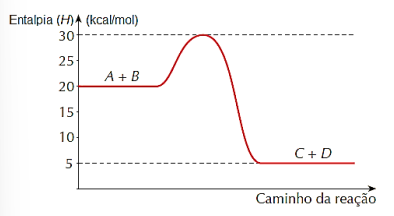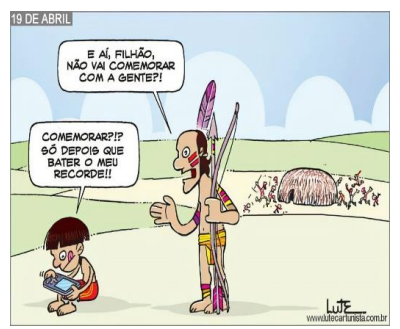Questões de Vestibular UEMG 2022 para Vestibular
Foram encontradas 48 questões
Considere a seguinte reação reversível genérica:
A + B ⇌ C + D
O gráfico termoquímico para essa reação está demonstrado na figura a seguir.

De acordo com os dados do gráfico, assinale
a alternativa correta.
Dados: Ka (NH4 + ) = 5,6x10-10; Kb (F- ) = 1,4x10-11
A figura a seguir representa o modelo do mosaico fluído da membrana plasmática.

Com base na figura, proteínas integrais e
proteínas periféricas estão indicadas,
respectivamente, em
Observe a charge.

Fonte: Lute.
Disponível em: http://blogdolute.blogspot.com/. Acesso em 03 jan 2022.
A crítica apresentada na charge se refere
( ) Em encostas que apresentam declividade acentuada, os movimentos de massa são fenômenos naturais, ou seja, fazem parte da dinâmica externa da crosta terrestre e são agentes que participam da modelagem do relevo ao longo do tempo.
( ) O movimento de massa e o processo de erosão fluvial que ocorrem nas encostas dos morros são ocasionados por, respectivamente: peso acumulado sobre o solo e grandes quantidades de chuva.
( ) Nas regiões serranas no Brasil, inclusive as próximas ao litoral, com Clima Tropical Semiúmido ou Úmido, são comuns os deslizamentos em condições climáticas extremas, como as dos meses de verão.
( ) As áreas de risco, como encostas de morros, costumam ser ocupadas, em grande parte, pela população de baixa renda, visto que a especulação imobiliária tem tornado o solo urbano mais caro, tornando inviável, para a população mais pobre, a aquisição de terrenos e moradias em áreas seguras e com boa infraestrutura.
I. A Declaração dos Direitos do Homem e do Cidadão foi escrita por influência das ideias iluministas em agosto de 1789.
II. A Declaração expressa a defesa e que todos os homens são iguais porque têm direitos iguais e a lei deve representar a vontade geral.
III. A Declaração expressa que a lei deve ser a representação da vontade da nobreza e do monarca.
IV. A Declaração dos Direitos do Homem e do cidadão expressa a defesa da vontade popular sob inspiração da Teoria dos Direitos Divinos do Rei.
HOBSBAWM, Eric. Era dos extremos: o breve século XX (1914- 1991). São Paulo: Companhia das Letras, p. 62.
Sobre o contexto sociopolítico anterior à Revolução Russa, analise as assertivas e assinale a alternativa que aponta as corretas.
I. O operariado russo, no período pré-revolucionário, vivia e trabalhava em condições precárias. As organizações operárias eram constantemente reprimidas pela polícia czarista.
II. O setor financeiro e industrial russo destacava-se no cenário europeu e constituía-se em um dos centros hegemônicos do capitalismo mundial.
III. A igreja ortodoxa era extremamente débil e sem força política nos meios aristocráticos russos.
IV. A ampla maioria da população estava no campo, submetida a condições de trabalho muito precárias devido a um sistema fundiário concentrado.